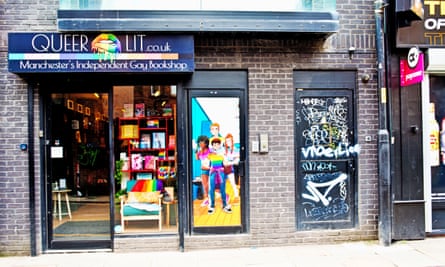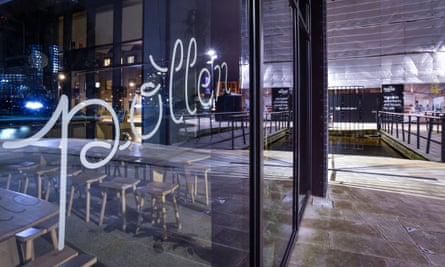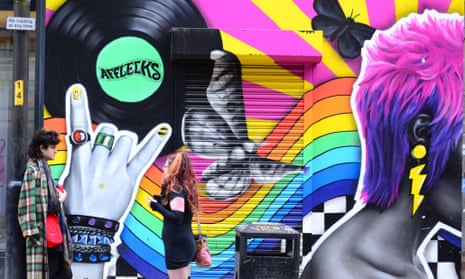On the first Sunday of May every year, Chapel Street, where central Manchester and Salford meet, comes alive with DIY art, music and spectacle at the Sounds from the Other City festival. It is a vibrant public celebration of the “community spirit and collaborative working” which co-director Emma Thompson says sustains much alternative culture in the region.
“Collaboration is core to what we do, to Greater Manchester as a city,” Thompson says. “People come together, and it crosses genres and art forms. Sounds from the Other City wouldn’t be turning 20 next year if it wasn’t for that. The fees we offer aren’t huge but people really get behind it, do it for the love of it.”
Thompson is forthright about the challenges facing those making experimental art: “It’s precarious. It feels unstable.” Costs are high, affordable space is scarce, funding is “very competitive”. Such forces are reshaping the creative landscape, literally. Manchester’s Northern Quarter still has its quirkier, arty hangouts, but generic bars and restaurants dominate. Leftfield culture is migrating to the city’s edges – or into Salford.
For the past 18 months, the band WH Lung have been based at Salford’s Islington Mill, a complex of artist-maker studios. Keyboard player Tom Sharkett says that a time when, in many ways, you’d “have to be mad” to pursue a life in music and art, it is inspirational to be surrounded by people “doing cool stuff for the right reasons”.
Opened in 2000, Islington Mill has latterly expanded into new buildings, including an adjacent trading estate. “The Mill feels like it’s taken on a new life. It feels strong,” says Sharkett. That’s also true of wider Manchester and Salford’s creative vigour. The obstacles are many, but the urge to make great art endures.
Music and nightlife

Arguably, Manchester music is as vibrant right now as at any point post-punk – from Anz to Space Afrika, Blackhaine to Sockethead, Mandy, Indiana to Michael J Blood. Much of that is down to the nurturing influence of The White Hotel, a former garage near Strangeways prison. In contrast with the bland gentrification of modern Manchester, this singular entity (grimy location, great sound, art school ethos, all-night-rave energy) has created space for new music to grow. “It’s a really important space,” says Thompson.
In the Northern Quarter, but in similar creative territory, club and gig venue Soup proves that all you need is a basement, a red light and, as well as a feeling, a programme that challenges its audience.
Other city-centre venues that defy convention include punk and indie haven the Star & Garter, Aatma, the Peer Hat and Peste (see Drink section below). But interesting things increasingly happen just outside the centre, often in unexpected places.
Two of Manchester’s vital grassroots venues – the Old Abbey Taphouse, on a science park in Hulme, south of the city centre; and DBA on Cheetham Hill to the north – are historic pubs that now double as club and music venues. “Stood outside the DBA,” says Sharkett, of this traditional Victorian boozer, “you wouldn’t have a clue what’s going on in there.” He once took veteran Glaswegian DJs Optimo in: “They’ve seen it all, but loved it.”
In these relatively obscure corners, music is encouraged to get weird: at warehouse venue Hidden; Salford’s Eagle Inn; the musically out-there N/OM; the Yard; and Partisan at Islington Mill. Affordable, inclusive and home to “a huge array” of LGBTQ+ events, the Partisan collective is one of the city’s most exciting venues, according to Thompson. “It’s a glorious place.”
Arts and culture

At 24 years young, Salford’s Islington Mill remains an essential creative hub. Its public events are led by Partisan, which hosts club nights, exhibitions, discussion groups and creative workshops, and “radioactive queer bar” Mirage. This bar-gallery-event space is home to genre-fluid evenings of art, performance and experimental music, from outfits including Kunstlicker and Short Supply.
Also in Salford, artists’ studio space Paradise Works regularly hosts exhibitions (entry by appointment), as does Oceans Apart, a contemporary painting gallery at OA Studios (by appointment, mainly weekends).
In central Manchester, visitors might spot pop-up exhibitions in multi-use spaces such as Studio Bee. HappeningInMCR curates a “micro-gallery” at alternative shopping emporium Affleck’s Palace, and the foyer of the Great Northern Warehouse leisure complex (already home to a collection of artist Stanley Chow’s illustrations) will soon feature work from 30 creatives based on site at GRIT Studios MCR’s new space.
For more established contemporary art there is Castlefield Gallery, currently celebrating its 40th anniversary, and ESEA Contemporary, which showcases work of east and south-east Asian heritage. Jane Jin Kaisen’s current Halmang exhibition explores themes provoked by the female seafood divers of South Korea’s Jeju island.
Book lovers in the Northern Quarter can explore LGBTQ+ bookshop Queer Lit, or Anywhere Out Of the World, which focuses on philosophy and poetry – and hosts similarly thought-provoking music events on its upper floor. Nearby, Village Books is a feast of pop-cultural periodicals and ’zines and houses a neat basement exhibition space.
Drink

Eager to drink different? You are in the right cities. There are exceptional cocktails at Schofield’s (currently number one on the UK Top 50 Cocktails Bars list); natural wine at KERB and Flawd; and incredible beer at Port Street Beer House, the Marble Arch or Smithfield Market Tavern. Further off-piste, the trading estate behind Manchester’s Piccadilly Station (dubbed the Beermuda Triangle by resident brewery Sureshot) is home to tap rooms from Track, Cloudwater and funky, mixed fermentation explorers Balance Brewing & Blending.
Want some cultural stimulation with your pint? In Salford, the Kings Arms is a real ale pub and theatre; YES is a student-friendly complex of bars, gig venues, DJs and pizza; and there is storied underground record shop, Eastern Bloc. By night, the latter morphs into a late bar for techno larks. Prefer guitars? Head to Oldham Street pub and music venues Gullivers, the Castle Hotel and cafe-bar Night & Day, which recently resolved its noise complaint issues with Manchester city council.
Newer venues include the Peer Hat, a brilliantly ramshackle boho pub and basement venue geared to marginal scenes. It is an all-ages refuge from the shinier, more commercial aspects of the Northern Quarter – somewhere, says Thompson, that promoters can put on weird, noisy stuff. “It’s intimate enough you can have 20 people in and it feels great. You can experiment. You need that.”
A little way north on the edge of Ancoats, White Hotel spin-off O! Peste Destroyed is a handsomely styled (ecclesiastical chic) bar, record and bookshop devoted to head-stretching work, with exhibitions and art installations in its basement. On Fridays, DJ Conor Thomas leads drinkers on ear-opening excursions into downtempo electronics, frazzled pop-edits and all points in between. A1 cocktails served by friendly bar staff complete this gem of a bar.
Food

Manchester’s food scene is growing at astonishing speed, with distinctive independents frequently setting the pace. A medium wrap from Go Falafel is still the best way to spend £5.50 in the Northern Quarter. The meat-free half of the menu at nearby Asmara Bella, a cosy, laid-back Eritrean and Ethiopian bistro, is a similar flavour-packed boon for vegans and vegetarians, as is Piccadilly’s Bundobust, with its Gujarati sharing plates.
Idle Hands has you covered for coffee and brunch. Pollen bakery-cafes are also good. Across town, Grub, hidden in an old light-industrial unit, is a bar and creative events space (home, for example, to Cultplex cinema and classes from Floating Art) and hosts street-food traders in its quirky, upcycled beer garden.
For something more refined, Another Hand on Deansgate Mews offers stellar plates of roasted cabbage in cider, smoked mussel and pancetta cream, or butter bean cacio e pepe. At nearby Exhibition, there is food from three different kitchens, including Baratxuri, a compelling homage to the Basque Country.
Higher Ground is arguably Manchester’s most singular dining experience. Using heritage and rare-breed ingredients from small producers (including Higher Ground’s partner, Cheshire market garden Cinderwood), chef Joe Otway creates dishes – coal-roasted pork, yellow peas and sprouting cabbage, or leek with smoked cod’s roe and thyme – which, although simple in outline, are generous, surprising and flavour intense.
Stay

Set around an impressive, five-floor atrium within Ducie Street Warehouse, Native Manchester’s 162 aparthotel rooms are modish, comfortable spaces. The keen aesthetic (post-industrial via Copenhagen) continues into the buzzy, ground-floor public areas. DJs soundtrack the weekend and spaces host events ranging from film screenings to pop-up vintage sales. Doubles from £100 B&B.
Also convenient for the Northern Quarter, Cow Hollow is a stylish, 16-bed boutique bolthole. Clever use is made of the building’s 19th-century industrial heritage, with ironworks and winding gears incorporated as features. Its small, glamorous bar evokes Rimini or Ibiza Town. Doubles from £99 B&B.
Sounds From The Other City is on 5 May, tickets £40 plus booking fee
